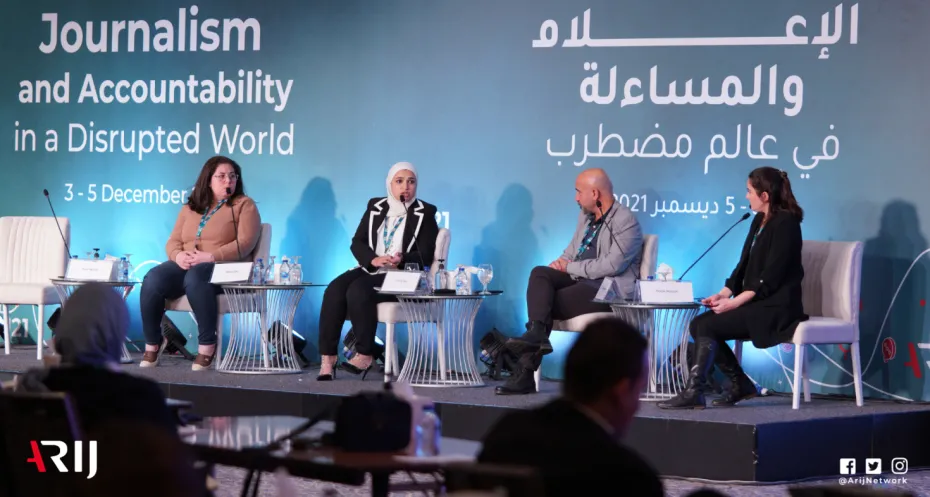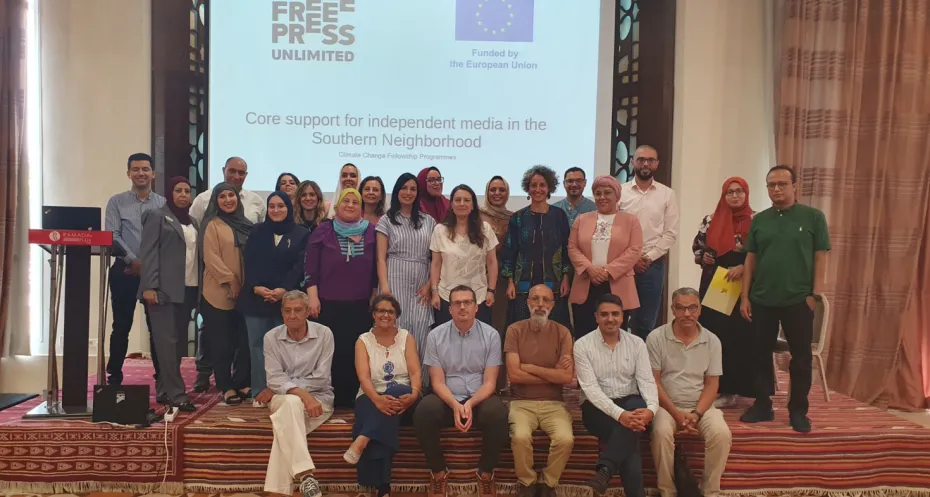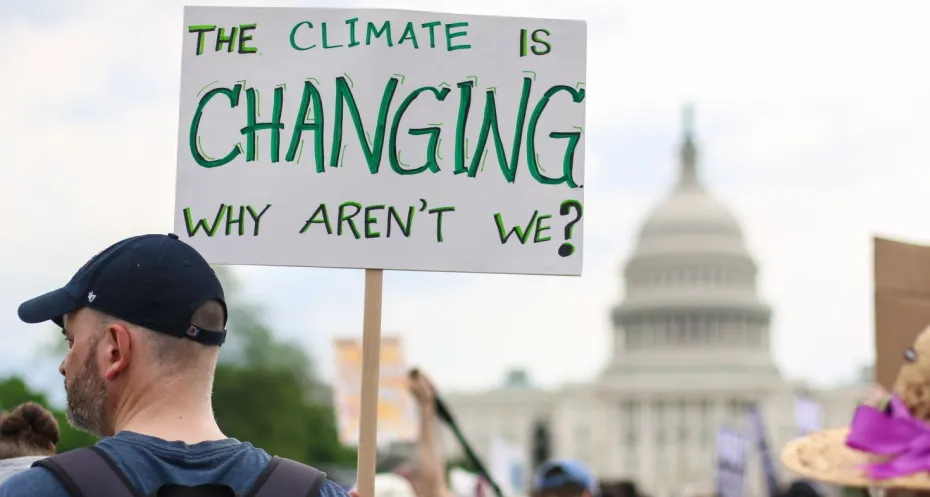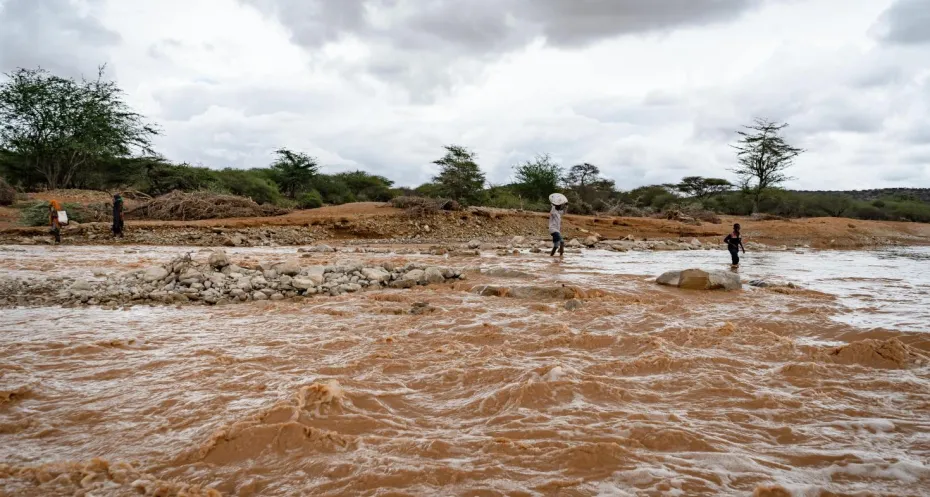Over 300 journalists discuss climate change, conflict and the role of journalism in the MENA

Since 2017 Free Press Unlimited has been part of the Planetary Security Initiative, working together with Clingendael Institute and The Hague Centre for Strategic Studies to include journalists in the worldwide discussion around climate issues. Last weekend the ARIJ (Arabic Reporters for Investigative Journalism) Annual Forum took place in Amman, Jordan, for which Free Press Unlimited, together with CFI, organised the climate track.
The Arab Reporters for Investigative Journalism (ARIJ) held its 14th annual forum in Amman, Jordan on 3 - 5 December 2021. The ARIJ forum is the Arab world’s largest gathering for investigative journalists. It offers opportunities to explore new topics and directions that tackle current challenges facing the region. One of the emerging topics of this year's forum is climate change and its impacts on security.
The relation between climate change and conflict in the Middle East is an increasingly important driver that should be on top of every investigative journalist's mind in our present day. Extreme weather events, droughts, water shortages, land degradation and food insecurity are just a few examples of how these factors destabilized societies and pose an additional burden for marginalized groups, for example women.

Planetary Security Initiative
Free Press Unlimited has worked on climate journalism with the Planetary Security Initiative (PSI), in which Free Press Unlimited and Clingendael Institute have connected local journalists and academics in countries highly affected by the effects of climate change, mainly in the Middle-East and Levant-region, to increase public awareness and spark international debate.
This initiative addresses the need for journalists to be included in the debate around the effects of climate change. Journalists working in the field have close contact with local communities, who are experiencing the environment changing around them. This generates a unique perspective and knowledge.
Interactive session
For the ARIJ Forum, Free Press Unlimited and the French Media Development Agency (CFI) hosted and organised an interactive session on the crossroad between climate change, conflict and journalism, debating the central question: ‘Where does climate change and conflict meet with journalism in the Middle East and North Africa (MENA)?’. Speakers of the session were: Tatiana Massaad (Reporter & presenter, France24), Khaled Sulaiman (Environmental Journalist, writer & trainer), Fatimah Jihad (Rights manager & journalist), Iman Alfares (journalist), Karim Elgendy (Associate Fellow Environment & Society Programme).
The session was a hybrid event attended by 70 participants physically, and 240 digitally. Experts from Iraq, Jordan, the UK, and Canada from the academic, civil society, and journalism field, were invited to engage with investigative journalists from the MENA region. Topics included the role of media in relation to climate action, and engaging storytelling approaches to make sure that the people affected are heard.
One of the panelists was Karim Elgendy, Associate Fellow of the Environment and Society Programme, at The Royal Institute of International Affairs, Chatham House. He shared: “The discussion on the role of climate journalism and specifically investigative reporting on the subject could not have come a minute too soon. As our understanding grows of the impacts of climate change on different regions, and of the needed climate action to avoid its worst effects, the world’s best communicators are still grappling with how to bring the climate debate into public discourse in a way that would shape public policies. The broadcaster Sir David Attenborough even went as far as describing saving the planet as 'a communications challenge'.”

He also stressed that collaboration is extremely important: “In the context of the MENA region, the linkages between climate change causes and effects remains missing in the mind of most people. To reverse this a concerted effort is needed, including scientists, experts, and communicators. A collaboration needs to emerge between these stakeholders that communicates the drivers of climate change and its complex environmental, social, and economic impacts, and links it to the experience of the peoples of the region in a way that galvanises climate action.”
Iman Al Fares, Senior Journalist on scientific and diplomatic issues at Al Ghad Newspaper, also spoke about the important role that journalists play in the issue of climate change: “Our role as journalists is to alert the whole world, especially the Middle East and North Africa, to the climate risks that await it, as it is one of the regions with the highest exposure to climatic instability. For example, it deals with the decrease of rainfall, and consequently the drying up of water sources and the depletion of groundwater on which most countries in the region depend.”
She continues: “Journalism and investigation today are the mirror of the citizen, the decision-maker and the expert to transmit, discuss and present climate change issues, which may also be a cause of conflicts and wars in the region.”
Boris van Westering, Free Press Unlimited programme coordinator of the MENA region: “It was a very lively and valuable debate. Many of the journalists expressed that it was an eye opening experience for them because for the first time they made the connection between climate change and the conflicts in their region.”
Climate Journalism Handbook
During the climate track of the ARIJ Forum, Free Press Unlimited also organised a network session with CFI during which the Climate Journalism Handbook “The Climate Mail" was launched. This is a handbook aimed at journalists who want to write about the consequences of climate change in their region. It was authored by Environmental journalist Khaled Sulaiman in the framework of MediaLab Environment project, implemented by CFI. Khaled Sulaiman also acts as a mentor in the fellowship programme of the PSI.
Khaled Suleiman also joined this session to engage with the journalists present. He shares: ”Journalists from many Arab countries came to Jordan to join the event, and we had the opportunity to exchange and discuss about what we are really facing, as journalists, when it comes to writing about environmental issues. And what I discovered was that there is a huge lack of information about environmental issues and its consequences.”
He continues: “There is lack of information about for example drought and other water related challenges. When I told more about this, the response was very good; many journalists from different countries reached out to me and asked me if there is a possibility to collaborate with them, to help them in how to make investigative articles about climate change. For this the Climate Journalism Handbook will be a great help.”
This session during ARIJ Forum aimed to inspire journalists to build on the insights they gained, and turn them into practical steps with the help of the Climate Journalism Handbook. All to encourage more and better journalistic stories about the major climate change issues that are presenting itself in the MENA region, like water shortage, a rise of temperature, and conflict.
Final fellowship announced
During the session the last fellowship of the PSI was announced, the Climate Journalism and Planet Security Initiative Fellowship, in which 10 journalists are selected to be part of a training and mentoring programme on climate journalism. The last few years this was exclusively for Iraqi journalists, now it is open to all journalists in the Middle East and North Africa. If you would like more information, please send an email to info@freepressunlimited.org, addressed to Boris van Westering.
Download the full Climate Journalism Handbook "The Climate Mail" here (in Arabic).
Photo in header: Panelists of the climate session at ARIJ Annual Forum, from left to right: Fatimah Jihad, Iman Alfares, Khaled Sulaiman and Tatiana Massaad. Photo by: ARIJ.



